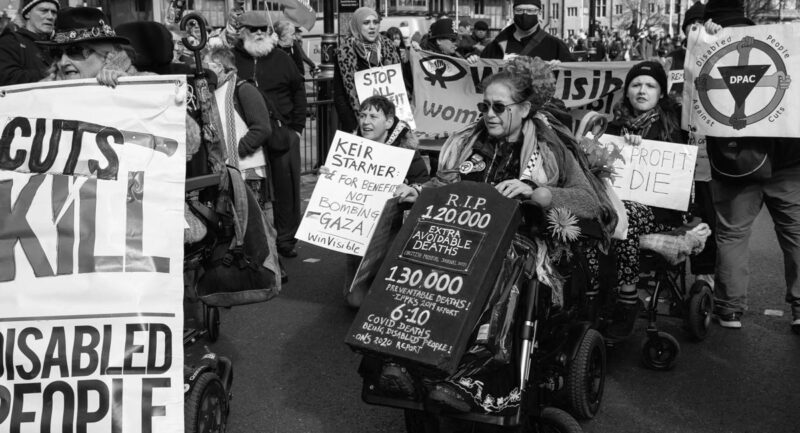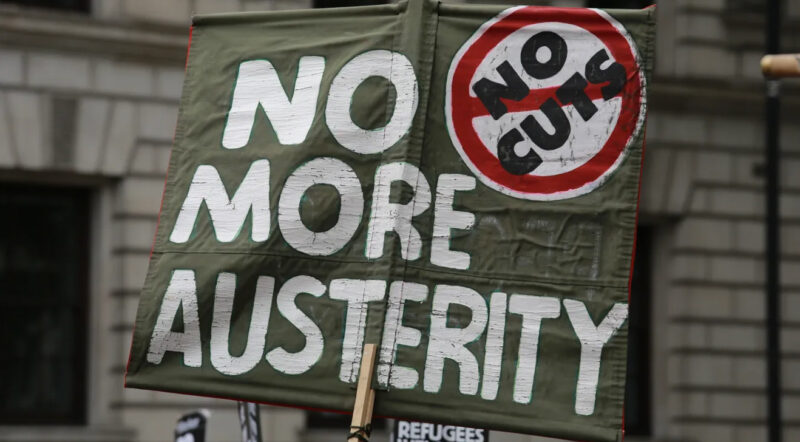PCS conference declares war on cuts
 PCS Annual Delegate Conference 2011 will be remembered as the conference that declared war – class war – on the coalition government, but whether we can win depends on the leadership’s willingness to go beyond the strategy agreed or, failing that, the membership taking up that challenge.
PCS Annual Delegate Conference 2011 will be remembered as the conference that declared war – class war – on the coalition government, but whether we can win depends on the leadership’s willingness to go beyond the strategy agreed or, failing that, the membership taking up that challenge.
Last year’s conference took place just days after the Tories came to power, and the main question on delegate’s lips was “how bad is this going to be?” The Coalition Government was quick to answer as it went about cutting up the public sector, imposing huge cuts on councils, education, health and also the civil service where they have imposed a pay freeze and have so far cut 100,000 jobs. Overall, the cuts threaten 1.3 million jobs across the whole economy as well as essential public services.
PCS over the last year lobbied the TUC to move against the cuts – to hold demonstrations like that on 26th March and at conference we passed a motion calling on them to take the next step of organising a general strike. The trade union movement has been slow to respond to the cuts and we’ve seen thousands of jobs lost in the meantime, but the 500,000 people marching for the alternative demonstrated the potential to fight back.
This year’s Annual Delegate Conference not only called on the TUC to organise a general strike but also made plans to bring out the civil service in defence of jobs, pay and pensions and most departmental conferences decided to organise further ballots over issues like privatisation. If a ‘yes, yes’ vote is won in the national ballot then we will be striking alongside education unions on the 30th June, but it was made clear that this would only be the beginning of our industrial campaign.
The decision to ballot was almost unanimous, with only two of over a thousand delegates voting against it. However, despite the overwhelming support for strike action the question still remains of whether the strategy will be enough. The Tories and Lib Dems are absolutely determined to carve up and privatise the public sector over the next four years, with David Cameron announcing on 20th February that “public services should be open to a range of providers competing to offer a better service… instead of having to justify why it makes sense to introduce competition in some public services – as we are now doing with schools and in the NHS – the state will have to justify why it should ever operate a monopoly.” They have already announced plans to privatise sections of the civil service like our pension administration and criminal enforcement and everyone can see that the contact centres would be lucrative contracts for a private company. Workplaces are being closed, the Hutton Report recommends an increase in pension contributions, the raising of the retirement age and a devaluation of pensions through the move from RPI to CPI. We will need one hell of a strike to stop these cuts, and realistically we will need to force the resignation of this government.
The national strategy recognises that we can’t stop the Tories alone so the strike ballot over jobs, pay and pensions is intended to allow us the legal ability to strike alongside any other unions on any of those issues for the life of the ballot. The hope is that over the summer other unions will join the campaign of industrial action and that in the autumn Unison will ballot its membership. Kicking off this campaign with the intention of starting a strikewave is absolutely necessary, but the question is what we will do if the government gets a court injunction against the ballot or what we will do if other unions don’t ballot.
On the question of an injunction, the answer is simple – the anti-union laws are there to prevent effective strike action and have been broken numerous times over the past years e.g. by Royal Mail and Lindsey Oil Refinery workers without legal repercussions. We cannot let the anti-union laws stand in the way of defending our jobs and services and even if our funds were to be frozen then we could fundraise from the general public and through donations from other unions to keep the strike going.
Whether other unions will ballot is a bigger issue, as our industrial strategy relies on the leaders of other trade unions feeling the pressure from their membership to fight back as PCS and the education unions walk out against cuts. If unions like Unite, Unison and GMB can ride out this pressure then will Mark Serwotka take the next step and publically call on them to bring out their members? In doing so we would face the wrath of the TUC but it became necessary to up the pressure in order to save our jobs, pay and pensions then Serwotka should do exactly that.
The problem with the industrial campaign is that it doesn’t deal with these issues and doesn’t link a strike wave over the summer to the end goal of a general strike, which is what’s needed if we are to break the Coalition Government. The call for a general strike remains something that we will call on the TUC to do, but considering that the TUC was reticent to even organise a national demonstration we have to be willing to organise it without them if necessary, through the individual unions agreeing to strike together and stay out until we win.
If the current strategy fails then will the leadership of PCS be willing to take the necessary next steps? Reps and activists should be prepared for the eventuality that they decide not to, we should organise to lobby them to take further action and we should organise to take this action if they refuse. There are thousands of militant trade unionists within PCS and if, in the face of the worst attack on the public sector in British history, our leadership falters then we must be prepared to defend public services by any means necessary. This means building a rank and file movement – a network of reps and activists – to support our leaders wherever possible but act without them where necessary. Such a rank and file movement was essential to the general strike of 1926 and we need one again to make the general strike of 2011 happen.






